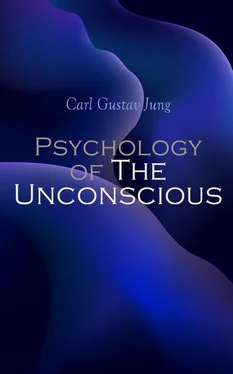Here we have a richly developed phantasy system before us. It is concerned with the subtle and perpetually undecided question as to whether the legendary figure of Judas is damned or not. The Judas legend is, in itself, mythical material, viz., the malicious betrayal of a hero. I recall Siegfried and Hagen, Balder and Loki. Siegfried and Balder were murdered by a faithless traitor from among their closest associates. This myth is moving and tragic—it is not honorable battle which kills the noble, but evil treachery. It is, too, an occurrence which is historical over and over again. One thinks of Cæsar and Brutus. Since the myth of such a deed is very old, and still the subject of teaching and repetition, it is the expression of a psychological fact, that envy does not allow humanity to sleep, and that all of us carry, in a hidden recess of our heart, a deadly wish towards the hero. This rule can be applied generally to mythical tradition. It does not set forth any account of the old events, but rather acts in such a way that it always reveals a thought common to humanity, and once more rejuvenated. Thus, for example, the lives and deeds of the founders of old religions are the purest condensations of typical, contemporaneous myths, behind which the individual figure entirely disappears. [54]
But why does our pious Abbé torment himself with the old Judas legend? He first went into the world to preach the gospel of mercy, and then, after some time, he separated from the Catholic church and became a Swedenborgian. Now we understand his Judas phantasy. He was the Judas who betrayed his Lord. Therefore, first of all, he had to make sure of the divine mercy, in order to be Judas in peace.
This case throws a light upon the mechanism of the phantasies in general. The known, conscious phantasy may be of mythical or other material; it is not to be taken seriously as such, for it has an indirect meaning. If we take it, however, as important per se, then the thing is not understandable, and makes one despair of the efficiency of the mind. But we saw, in the case of Abbé Oegger, that his doubts and his hopes did not turn upon the historical problem of Judas, but upon his own personality, which wished to win a way to freedom for itself through the solution of the Judas problem.
The conscious phantasies tell us of mythical or other material of undeveloped or no longer recognized wish tendencies in the soul. As is easily to be understood, an innate tendency, an acknowledgment of which one refuses to make, and which one treats as non-existent, can hardly contain a thing that may be in accord with our conscious character. It concerns the tendencies which are considered immoral, and as generally impossible, and the strongest resentment is felt towards bringing them into the consciousness. What would Oegger have said had he been told confidentially that he was preparing himself for the Judas rôle? And what in ourselves do we consider immoral and non-existent, or which we at least wish were non-existent? It is that which in antiquity lay widespread on the surface, viz., sexuality in all its various manifestations. Therefore, we need not wonder in the least when we find this at the base of most of our phantasies, even if the phantasies have a different appearance. Because Oegger found the damnation of Judas incompatible with God’s goodness, he thought about the conflict in that way; that is the conscious sequence. Along with this is the unconscious sequence; because Oegger himself wished to be a Judas, he first made sure of the goodness of God. To Oegger, Judas was the symbol of his own unconscious tendency, and he made use of this symbol in order to be able to meditate over his unconscious wish. The direct coming into consciousness of the Judas wish would have been too painful for him. Thus, there must be typical myths which are really the instruments of a folk-psychological complex treatment. Jacob Burckhardt seems to have suspected this when he once said that every Greek of the classical era carried in himself a fragment of the Oedipus, just as every German carries a fragment of Faust. [55]
The problem which the simple story of the Abbé Oegger has brought clearly before us confronts us again when we prepare to examine phantasies which owe their existence this time to an exclusively unconscious work. We are indebted for the material which we will use in the following chapters to the useful publication of an American woman, Miss Frank Miller, who has given to the world some poetical unconsciously formed phantasies under the title, “Quelque faits d’imagination créatrice subconsciente.”— Vol. V., Archives de Psychologie, 1906. [56]
CHAPTER II
THE MILLER PHANTASIES
Table of Contents
We know, from much psychoanalytic experience, that whenever one recounts his phantasies or his dreams, he deals not only with the most important and intimate of his problems, but with the one the most painful at that moment. [57]
Since in the case of Miss Miller we have to do with a complicated system, we must give our attention carefully to the particulars which I will discuss, following as best I can Miss Miller’s presentation.
In the first chapter, “Phénomènes de suggestion passagère ou d’autosuggestion instantanée,” Miss Miller gives a list of examples of her unusual suggestibility, which she herself considers as a symptom of her nervous temperament; for example, she is excessively fond of caviar, whereas some of her relatives loathe it. However, as soon as any one expresses his loathing, she herself feels momentarily the same loathing. I do not need to emphasize especially the fact that such examples are very important in individual psychology; that caviar is a food for which nervous women frequently have an especial predilection, is a fact well known to the psychoanalyst.
Miss Miller has an extraordinary faculty for taking other people’s feelings upon herself, and of identification; for example, she identifies herself to such a degree in “Cyrano” with the wounded Christian de Neuvillette, that she feels in her own breast a truly piercing pain at that place where Christian received the deadly blow.
From the viewpoint of analytic psychology, the theatre, aside from any esthetic value, may be considered as an institution for the treatment of the mass complex. The enjoyment of the comedy, or of the dramatic plot ending happily is produced by an unreserved identification of one’s own complexes with the play. The enjoyment of tragedy lies in the thrilling yet satisfactory feeling that something which might occur to one’s self is happening to another. The sympathy of our author with the dying Christian means that there is in her a complex awaiting a similar solution, which whispers softly to her “hodie tibi, cras mihi,” and that one may know exactly what is considered the effectual moment Miss Miller adds that she felt a pain in her breast, “Lorsque Sarah Bernhardt se précipite sur lui pour étancher le sang de sa blessure.” Therefore the effectual moment is when the love between Christian and Roxane comes to a sudden end.
If we glance over the whole of Rostand’s play, we come upon certain moments, the effect of which one cannot easily escape and which we will emphasize here because they have meaning for all that follows. Cyrano de Bergerac, with the long ugly nose, on account of which he undertakes countless duels, loves Roxane, who, for her part unaware of it, loves Christian, because of the beautiful verses which really originate from Cyrano’s pen, but which apparently come from Christian. Cyrano is the misunderstood one, whose passionate love and noble soul no one suspects; the hero who sacrifices himself for others, and, dying, just in the evening of life, reads to her once more Christian’s last letter, the verses which he himself had composed.
Читать дальше












